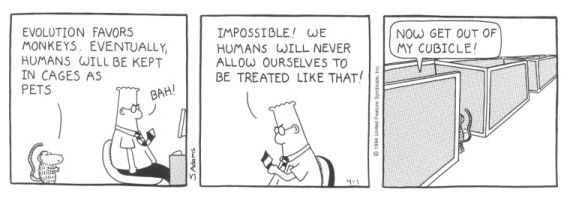Cubicles Lower Productivity But Management Loves Them
The private office is quickly becoming a relic, despite the loss of morale and productivity that comes from open floorplans.
The private office is quickly becoming a relic, despite the loss of morale and productivity that comes from open floorplans.
NYT (“From Cubicles, Cry for Quiet Pierces Office Buzz“):
Cubicle culture is already something of a punch line — how many ways can we find to annoy one another all day? — but lately the complaints are being heard by the right people, including managers and social scientists. Companies are redesigning offices, piping in special background noise to improve the acoustics and bringing in engineers to solve volume issues. “Sound masking” has become a buzz phrase.
Scientists, for their part, are measuring the unhappiness and the lower productivity of distracted workers. After surveying 65,000 people over the past decade in North America, Europe, Africa and Australia, researchers at the University of California, Berkeley, report that more than half of office workers are dissatisfied with the level of “speech privacy,” making it the leading complaint in offices everywhere.
“In general, people do not like the acoustics in open offices,” said John Goins, the leader of the survey conducted by Berkeley’s Center for the Built Environment. “The noisemakers aren’t so bothered by the lack of privacy, but most people are not happy, and designers are finally starting to pay attention to the problem.”
[…]
The original rationale for the open-plan office, aside from saving space and money, was to foster communication among workers, the better to coax them to collaborate and innovate. But it turned out that too much communication sometimes had the opposite effect: a loss of privacy, plus the urgent desire to throttle one’s neighbor.
“Many studies show that people have shorter and more superficial conversations in open offices because they’re self-conscious about being overheard,” said Anne-Laure Fayard, a professor of management at the Polytechnic Institute of New York University who hasstudied open offices. “Everyone is still experimenting with ways to balance the need for collaboration and the need for privacy.”
[…]
“You talk to more people in an open office, but I think you have fewer meaningful conversations,” said Jonathan McClelland, an energy consultant working in the loft. “You end up getting interrupted a lot by people’s random thoughts.”
Despite complaints like this around the world, the open-plan design remains the norm, partly because it is cheaper and partly because many managers believe the plusses outweigh the minuses. It is especially popular in workplaces that require continual informal collaboration, like newsrooms, trading floors and political campaign offices.
[…]
Researchers at Finland’s Institute of Occupational Health have studied precisely how far those conversations carry and analyzed their effect on the unwilling listener: a decline of 5 percent to 10 percent on the performance of cognitive tasks requiring efficient use of short-term memory, like reading, writing and other forms of creative work.
“Noise is the most serious problem in the open-plan office, and speech is the most disturbing type of sound because it is directly understood in the brain’s working memory,” said Valtteri Hongisto, an acoustician at the institute. He found that workers were more satisfied and performed better at cognitive tasks when speech sounds were masked by a background noise of a gently burbling brook.
Unfortunately, building out spaces with private offices is both very expensive and relatively inflexible. What frequently winds up happening is what’s happened at my workplace: offices designed for one person become shared offices. Cubicle walls are often re-configurable, allowing adaptation as the size and composition of the workforce changes.
At the same time, though, almost no one likes working in cubicles or, worse, spaces with no walls at all. Except, of course, managers and executives. They can more easily see who’s at their desk and monitor what’s going on. Additionally, many are convinced that the lack of physical walls leads to a dropping of psychological ones and thus fosters team building. The evidence for this is, well, scant.
Thus far, the response to worker complaints and various studies pointing to the inefficiencies of open floorplans has been to figure out ways to mask the noise. Even if technology fully solves that issue–and it has come quite a way–I don’t see how technology can fix resentment over loss of privacy.







In my experience, the managers and executives get walls. Another way to demonstrate their dominance over their lessers, I guess.
In truth, I’ve been in both cubes and offices. I found that cube farms or, better yet, no cubes at all, are useful for an environment that requires a lot of collaboration. Newsrooms, for example, where copy editors, reporters, and substantive editors need to be able to interact with each other in real time, and do so quickly.
The psychological walls are the only ones I have left, I’m not giving them up.
You’re misusing the term “open floorplan” here. That refers to an office system where people don’t even get cubicles: they have desks long the walls of an open area with no dividers between them and a large “common workplace” in the middle.
Like this:
http://www.increaseroom.com/wp-content/uploads/2011/07/Open-Floor-Plan-Office-Design.jpg
@Stormy Dragon: Fair enough. I’m looking for a generic term to cover true open floorplans but also other setups short of actual offices.
I worked at an A/C compressor plant outside Jackson, MI that was Japanese owned and managed. The head office consisted of one room with the plant’s executive leader’s desk in the center, his management arrayed around him, and staff arrayed at the periphery. No walls. The staff got the windows and no one was out of eye-shot of anyone else. Politeness seems to be required for the place to run at all, and it was run very well while I was there.
It can’t, but time can. It’s a change management process, and it happens over a period of time. It really depends on the culture of the company how fast or slow it occurs, if at all.
As for “managing people by sight”, this is also a culture change to “managing by objectives,” which a lot of managers have no problem doing at all because that is how they are being measured.
I’ve worked in both office-door and open floor cubicle environments and I do not have a strong opinion either way. Some positions should have offices because of the nature of position responsibilities and so forth.
I can tell you this, the lowest morale places I’ve worked have been where senior management office doors are always closed – the message is ‘busy, don’t bother me … I’ll bother you.’
I’ve also worked directly for CFOs who shared their calendar with me, and they indicated that the door was open unless they had an appointment or a conference call that required privacy. It worked well – respect is a two way street.
As an Engineer, I hate cubicles. You hear all conversations whether you want to or not and have others hear your conversations and end up butting in. It’s especially bad when I’m talking to other Engineer’s, Contractor’s or clients when it would be nice to not be overheard.